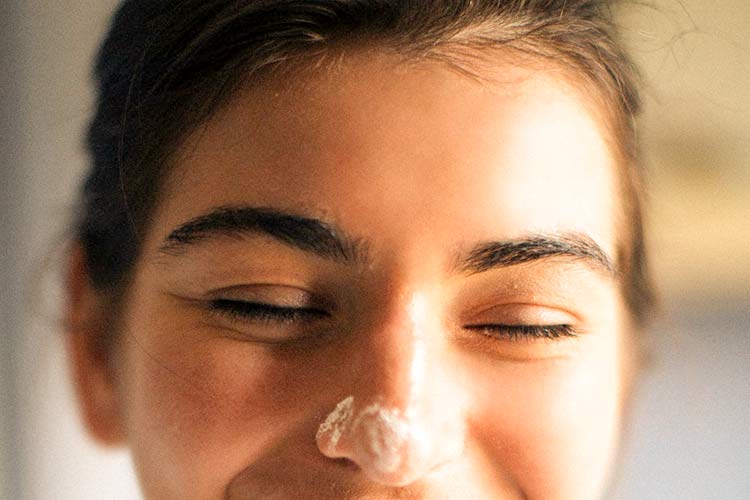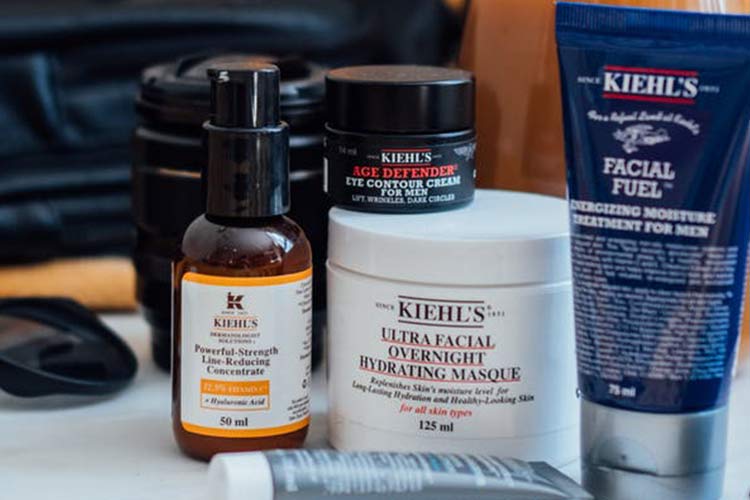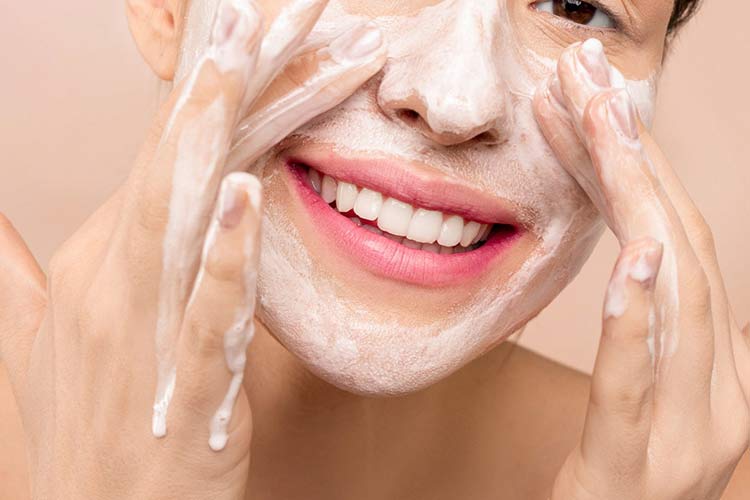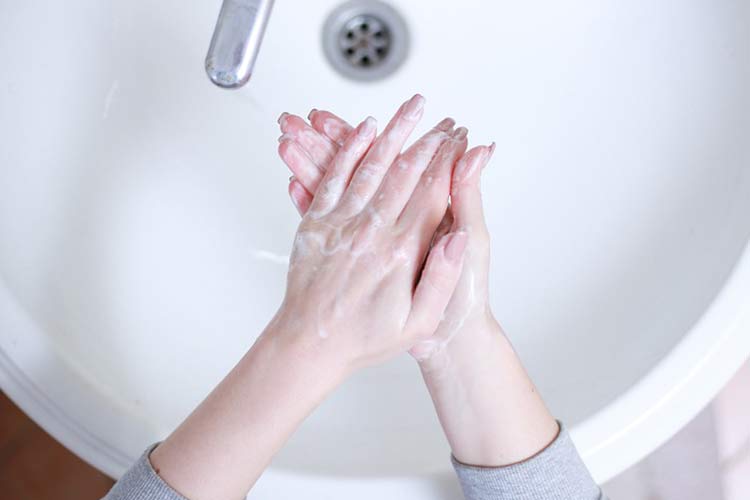If you’re in college and don’t have all the money in the world to spend on expensive skincare products (with your youth, you don’t need to do that, anyway!), we have some practical skincare tips for you that will help you get that healthy skin without having to spend big bucks on products.
The truth is there are no shortcuts to flawless skin. The only way to get that perfectly healthy skin is through self-discipline. Photo filters go a long way, but real life is #nofilter. Well, makeup is sort of a real-world filter but that’s a story for another day.
Skin Care Guide for College Students
These are the topics we’ll be covering in this article.
Stay hydrated
The single most important aspect of healthy skin is hydration. Your skin is your body’s biggest organ and it needs plenty of water to function and stay healthy. Proper hydration also leads to improved mood, boosted energy, and weight loss.
Drink water
The good news is water is cheap as long as you avoid expensive bottled water like Fiji.
Drink at least 73 ounces (2.12 liters) of water daily. Don’t consume that much water in one sitting. Unlike camels, our human body isn’t designed to store water very well. The excessive water we drink doesn’t get absorbed. Binge drinking water results in frequent peeing and possibly poisoning. In other words, it’s not helping.
So remind yourself to drink water throughout the day. One way to do this is to get yourself a good water bottle and keep it where you can see it. For example, on your desk or in the side pocket of your backpack.
On coffee and tea
Scientists believe that coffee and tea are just as hydrating as water. If you’re a coffee addict, this may be a relief to hear. But many people are experiencing dryness in their mouth and skin after drinking these caffeinated beverages. Personally, despite what studies say, I feel that my skin and mouth become drier after coffee. So I would recommend going off these beverages completely, but you should do some experiments yourself to see what works best for you.
Another side effect of caffeine is that it distorts your natural energy level and sleepy cycle. That means you you’re likely to push your body too hard when it already needs rest. You’re also more likely to get insomnia at night which causes your skin to look dull and pale the next day.
Hydrate your skin externally
This is where skincare products come in. You will need a product (or multiple products) that can perform these two functions:-
- Lock in moisture (prevent moisture loss)
- Hydrate
If you leave a glass of water on the table and return to it after a while, you will notice that the amount of water in the glass is now less than it was before. That’s evaporation – which is science-speak for water disappearing into thin air. The same phenomenon happens to our skin. That’s why you need products to help prevent water loss. Most products do more than that. In addition to locking in moisture, many products also help to hydrate your skin. These skincare products are usually toner, moisturizer, lotion, or toning lotion.
Nutrients for healthy skin
Your skin is not a monolithic structure. It has layers and complexity. As we have discussed in the previous section, hydration or water is crucial to your skin. But just like plants, your skin doesn’t survive on water alone. The skin needs nutrients to function optimally – to protect and to look amazing. Below are some tips and further readings on nutrients for the skin.
Make veggies and fruits your friend
The goal is a healthy and balanced diet. Meat and fish are just as important for supple, glowing skin. But many people aren’t eating enough vegetables and fruits! These two food groups contain many vitamins and nutrients that will help to protect and revitalize your skin. So make sure you make them a core part of your diet.
Avoid unhealthy food
You may be the lucky one who can eat anything anytime and your skin will still be glowing. However, not all of us are this lucky. Sometimes not eating healthy or enough fruits and vegetables to balance out the junk food may cause outbreaks. Try to minimalize or avoid unhealthy food altogether if you can.
Take supplements
A balanced diet with a healthy dose of greens and fruits is easier said than done – especially when you’re a busy college student. If you’re staying off-campus, you either have to cook your own food or rely on some instant food like microwave mac and cheese and ramen. It’s supposed to be easier if you’re staying in a dorm, the dining hall usually provides a range of foods to choose from, you simply have to choose your food carefully. However, even if you do that, chances are there are some nutrients or vitamins that your body is missing and that reflects in a less-than-perfect skin condition. This is why we recommend taking multivitamins. If budget is an issue, instead of following the dosage on the bottle, you can take the vitamins twice a week or once a week. It won’t be as effective but it will definitely help.
Further Readings
- 12 Best Foods for Healthy Skin – Healthline
- Nutrients for Healthy Skin – WebMD
Skincare Products for College Students
On the market, there are different kinds of products each with different functions and purposes. But what products do you need exactly? We wouldn’t be recommending any specific brand here but here are the types of skincare products you should check out.
Bare Minimum Skincare Products
These are the two essential products that everyone needs to have.
- Cleanser – face wash that removes dirt and other substances from the surface of your face
- Moisturizer – replenishes lost moisture, provide some protection to your skin
Take out a loan if you must, cleanser and moisturizer are the absolute nonnegotiable bare minimum you need in order to make sure that your skin can function properly. Unfortunately, unless you’re blessed with naturally healthy skin, your skin won’t be glowing by using just these two products. But it will definitely prevent breakouts, keep your face clean, and prevent dry & flaky skin.
Recommended Minimalist Skincare Product Types
A step-up from the bare minimum list. These are the skincare product types we recommend to college students. With these products, your skincare routine goes full-cycle.
- Makeup remover – remove makeup. Makeup residues could block pores and cause inflammation
- Cleanser
- Exfoliate – remove dead skin cells
- Toner – apply after washing your face. It tightens the pores to prevent moisture lost. Toner is especially helpful if you like to take long hot showers. Avoid alcoholic toners. While an alcoholic toner is antimicrobial and does an excellent job at preventing large pores, it tends to dry out your skin. If you can’t find a good standalone toner, invest that money in a good lotion instead.
- Moisturizer – moisturize and protect.
Further Readings
- Best Skincare Products for College Students – RealSimple
Recommended Skincare Routine for College Students
A skincare routine is the fixed steps you take to maintain healthy skin. It is important that you stick to one routine so that it forms a habit. Just like studying, discipline is the key to success of your skincare regimen.
Every person’s skincare routine is different but the core philosophy is the same. Below is the skincare routine we recommend college students to try out.
Skincare Routine Recommended for College Students
1. Remove makeup
Before using the cleanser, remove makeup from your face. Micellar water works well for most people – especially if you’re only wearing light makeup. Micellar water is a water-based makeup remover. Unlike oil-based products, a water-based makeup remover doesn’t make your face feel oily afterward. That means it doesn’t add to the workload of the cleanser. The downside of it is it doesn’t work too great with heavy makeup.
2. Cleansing
Find a cleanser that works for your particular skin type. A cleanser can make or break your skin health. It is counterproductive to have a cleanser that dries out your skin then try to compensate with a moisturizer afterward. If you’re still exploring what works for you, I suggest starting with cleansers that are created for people with “dry skin” or “normal skin” or “combination skin”. Cleansers that are labeled “for oily skin” can be overly drying which can be disastrous if you mistake dry skin as oily skin. This happens very often. A dry skin type secretes oil as a response to dryness. When you use a strong cleanser on a dry skin type, the skin becomes even drier and secrete more oil – forming a vicious cycle that hurts your skin.
3. Exfoliating
Dead skin cells flake off naturally but they take their own sweet time. And some of them remain on your skin forming dull, flaky patches. They also cause breakouts. Exfoliate is the removal of dead skin cells from your face. By removing them, your skin looks better and absorbs nutrients from serums and moisturizers more effectively. The downside of exfoliating is that your skin becomes more vulnerable to harmful sun rays. So make sure you only exfoliate at night and wear sunblock during the daytime.
Exfoliate once or twice a week after cleansing. Cleansing helps remove oil and dirt so that the exfoliating agent can work on the skin more effectively. There are two ways to exfoliate: mechanical / physical and chemical.
Mechnical exfoliation is the physical removal of dead skin cells with the help of scrubs, microbeads, brush, etc. This type of exfoliation is more aggressive and can damage delicate skin such as your face. It is also less predictable because the amount of exfoliation also depends on the force you apply (i.e. how hard you scrub). We recommend this method for body and feet exfoliation because the result is more immediate and it’s more cost-effective than chemical exfoliation products.
Chemical exfoliation removes dead skin cells by chemically dissolving them. Depending on the strength of the product, chemical exfoliation can be aggressive. But most over-the-counter (OTC) products are mild. If you aren’t certain, first try it on a hidden spot on your body then move on to a less visible spot on your face or neck before applying it to your entire face. Some common compounds used in chemical-based exfoliating products are alpha-hydroxy acids (AHA), beta-hydroxy acids (BHA), and retinoids (e.g. retinol).
4. Moisturizing
After cleaning your face, pat dry with a towel. While it’s still damp, apply moisturizer. The moisturizer forms a barrier between your face and the outside world. In the case of moisturizers with SPF protection, harmful UV rays are blocked or filtered before it reaches your skin cells. However, the main purpose of a moisturizer is to prevent loss of moisture and replenish moisture that is lost inevitably throughout the day.
Choose your moisturizer carefully. If you’re still exploring what products work best for you, start with something milder and water-based. If it isn’t moisturizing enough for your skin type, your skin will look visibly dry but it’s short-term and has an easy fix – just switch to a different moisturizer. However, if a moisturizer is too oily or heavy for your skin, its effects can be more long term. For example, it may clog your pores and cause breakouts which can lead to scars; it can also cause milia – terrible bumps that are very hard to get rid of.
Read also: 25 Chic College Dorm Room Ideas for Girls
More College Skincare Tips and Hacks
College Skincare Hacks
- Bedside beauty pouch
- Wear sunscreen
- Pamper your skin
- Get plenty of sleep
- Clean your phone
- Don’t touch your face
- Wash your hands often
- Visit a dermatologist
Keep a Bedside Beauty Pouch
College years can be busy – with social events (e.g. dorm parties, homecoming, etc) and studies. Sometimes you’ll be getting home late at night too tired to get anything else done. You just want to go straight to bed skipping your skincare routine. Obviously this is terrible for your skin. As we mentioned earlier, the only path to healthy skin is discipline. Having said that here’s a skincare tip for you – keep a beauty pouch by your bed. In it, keep some face wipes and moisturizer. When you’re too tired to go to the washroom, at least keep your face clean using face wipes then apply some lotion to keep it moisturized. Note that this hack is a double-edged sword. While a bedside beauty pouch is convenient, it promotes bad skincare habits by giving you an easy way out of your skincare routine.
Read also: 10 Tips to Keep Your Dorm Room Clean & Tidy
Sunscreen is a must
Sunscreen is not optional. While parts of the body are protected by clothes and not under direct sun radiation, your face is directly exposed to sun rays (ultraviolet radiation). UV radiation is a major risk factor that can lead to skin cancer. Less serious troubles include sunburn and age spots. Sunburn is a temporary but painful annoyance. On the other hand, age spots are resilient imperfections that are difficult to get rid of.
While the sun is a good source of Vitamin D which prevents premature aging, it is ironic that it ages your skin. So always wear a good sunscreen. There are also face moisturizers with SPF protection that protects your face against harmful UV rays.
Pamper your skin (and yourself)
Sticking to a skincare routine is important. But a routine is a routine. By design, it is supposed to not make you feel anything – no resistance but no enjoyment either.
Once in a while, try something new. Create a spa for yourself, even if you’re on a budget. There are thousands of recipes with ingredients based on natural products, including tea tree oil, olive oil, and aloe vera. Light up some candles and indulge yourself with your own sheet masks. Learn how to make a facial massage and do that as well. Relaxation is good for you and your skin. This is also a fun activity to do when you’re bored in your dorm room.
Get plenty of sleep
Your skin quality can be negatively impacted by cortisol which is the stress hormone. In college, there are many stressors such as studies, finance, wondering if your crush likes you, etc that might stress you out. While you can’t sleep away these problems, studies show that you can sleep away the stress. Getting enough sleep can help lower your stress and thus the cortisol level – which is good for your skin. The lack of sleep adds to your stress level and so you should really avoid that.
Sleep is vital for your skin cells to regenerate. There is evidence that the skin cells regenerate twice as fast when you’re asleep. Also, it goes without saying that if you don’t get enough sleep, your priority in the morning will definitely not be your skincare routine – not when your econ class starts in 15 minutes.
Clean your phone
No, I don’t mean to free up some ram, although that is a great way to speed up your phone. Hear me out. If you’re like most people, you’re probably spending a lot of time on your phone. In the meantime, you use public transportation, open convenience store doors and touch other dirty surfaces that hundreds or thousands of people have touched. When you’re texting on your phone, all the microbes and dirt from your hands are now all over the phone. After washing your hands, your hands are supposed to be clean but since your phone is dirty, your hands become dirty again. It has become a vicious cycle. To break this cycle, the simple solution is to wipe your phone with an antibacterial wipe and wash your hands often.
Don’t touch your face
Not trying to awaken the germaphobe in you, but our hands are dirty. They gather dirt and pick up microbes such as bacteria, fungi, and viruses. Not all microbes are bad. But some of these microbes can cause inflammation, skin diseases, and other kinds of diseases. So be mindful of what your hands are doing and make a conscious effort at keeping them away from your face.
Wash your hands often
Studies found that people touch their faces 16 times an hour on average. I’m sure you can lower that number if you’re being mindful but to make it more effective, you’ll want to wash your hands often. Don’t just splash your hands with some water and call it done. Make sure that you’re actually washing them properly – with soap and dedication. Wash every nook and cranny. That includes under your nails and between your fingers.
Visit a dermatologist
Obviously this is going to cost you money but there are times when seeing a dermatologist can be worth it. One good example is when you have a serious acne problem. The rule of thumb is if you feel like your skin problem is a medical condition, chances are you need to see a dermatologist. Serious skin problems can’t be fixed by eating more vegetables or drinking more water.
There are different skin types and different reactions to the same product. Visit a specialist to identify your skin type and what works for you. Discuss with your dermatologist about your diet, your eating habits, and medical history so they know what can trigger some skin issues. They will also help customize a skincare routine and recommend products for you.
Your Best Kept Secret Skincare Tip?
Amazing skin is not a given. It is accumulated from a series of small positive habits and routines. There are no shortcuts to perfect skin but there are steps that you can take to get closer to perfection. Get used to the idea that you will have to follow a routine and that you will have to be consistent.
Having said that, what have you tried that works for you? Do you have any skincare tips you think work great for college students?







